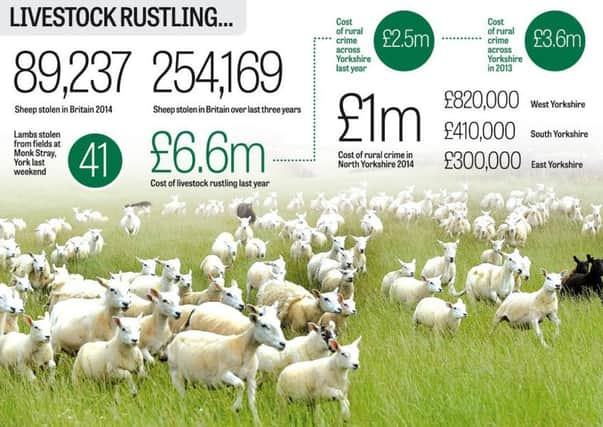Farmers train police in new bid to tackle £6.6m livestock thefts


During the decade to 2010, livestock rustling took place at historically low levels, while rural thieves concentrated on stealing quad bikes, tractors and expensive power tools from farms, rural insurer NFU Mutual said.
And last year the most targeted items from farms and rural properties in Yorkshire were all-terrain vehicles such as quad bikes, as well as tools and fuels; both domestic heating oil and farmers’ supplies of ‘red’ diesel, the insurer’s Rural Crime Survey found.
Advertisement
Hide AdAdvertisement
Hide AdBut, based partly on claims it has handled itself over the last year, NFU Mutual believe the cost of rustling to agriculture was over £6.6m last year, with improved security on farm vehicles cited as another reason why criminals were instead targeting animals.
Northern Ireland was worst hit by rustlers, followed by the North East of England including Yorkshire, the crime survey found.
Based on insurance claims, 89,237 sheep were stolen across Britain in 2014, and in the latest incident in North Yorkshire, some 41 lambs were stolen from fields at Monk Stray in Malton Road, York over the weekend.
In The Yorkshire Post today, North Yorkshire’s Police and Crime Commissioner Julia Mulligan said different approaches were now needed to combat rural crime. In that vein, the force has forged a new partnership with the National Farmers’ Union and other government agencies to tackle livestock rustling.
Advertisement
Hide AdAdvertisement
Hide AdBuilding on the success of a similar project in Lancashire, they have developed a programme of on-farm training for rural police officers in the Yorkshire Dales. The training will help police officers learn different ways of identifying missing sheep, through DNA samples, electronic ear tags, chipped devices inserted into the animal’s stomach and movement records.
The initiative also involves developing a network of farmers to be on hand as local experts to assist the police in identifying stolen sheep or to provide longer term housing for sheep that cannot immediately be returned to their owners. Local auction marts will also provide some overnight accommodation for seized sheep where investigations are pending.
Richard Pearson, the NFU’s regional director for Yorkshire and the North East, said: “We are fortunate that our North Yorkshire Police and Crime Commissioner is heading up the National Rural Crime Network and I know Ms Mulligan is committed to working with the local farming community to tackle the scourge of livestock theft.
“We hope a new initiative that will see local farmers helping to train police officers on the intricacies of the sheep trade, and providing practical roadside support where necessary, will bring real dividends so that hopefully next year’s crime statistics will show a much needed respite on this front.”
Advertisement
Hide AdAdvertisement
Hide AdThe cost of rural crime in Yorkshire fell from £3.6m in 2013 to £2.5m in 2014, the NFU Mutual’s Rural Crime Survey found.
Mr Pearson added: “Although it’s reassuring that the considerable efforts being made to tackle rural crime appear to be taking effect, it will come as no surprise to Yorkshire farmers that livestock theft continues to be a real cause for concern.”